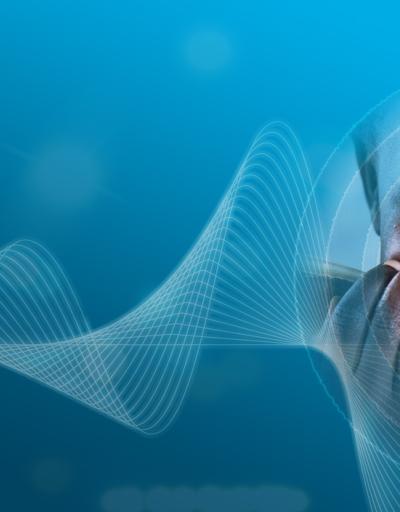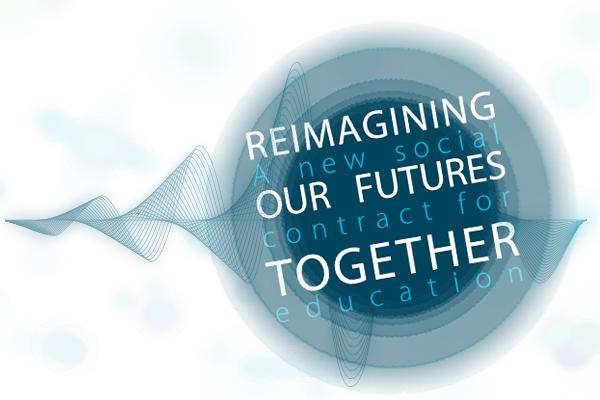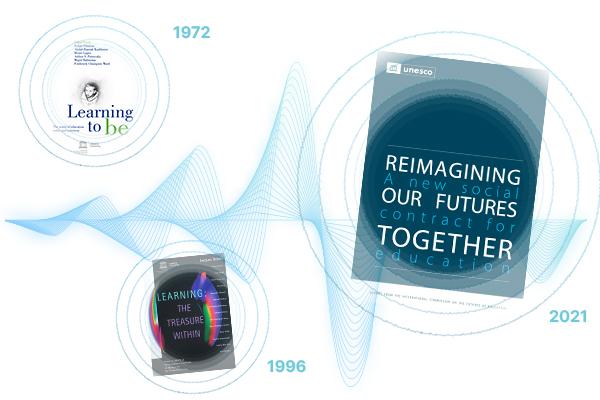

The Initiative 2019-2021
“Reimagining Our Futures Together: A new social contract for education”, released in November 2021, was the culmination of two years of worldwide consultation and reflection by the International Commission on the Futures of Education. It is not a blueprint for action, rather an invitation to think and act to renew the social contract for education. The Commission’s report proposes that we can best renew education by building a new social contract for education that can repair past injustices while transforming the future. This entails revisiting our implicit agreements on how to cooperate in organizing learning and knowledge for shared benefit across society. The Report is a call to action to enhance global solidarity and open new frontiers for innovation, looking towards the horizon of 2050 and beyond, shaping our multiple potential futures.

Key figures
“Our hope is that the proposals this report presents – as well as the public dialogue and collective action it calls for - will serve as a catalyst to shape futures for humanity and the planet, that are peaceful, just and sustainable.”
Key recommendations from the International Commission on the Futures of Education report
Firstly, the Report re-affirms core values, the foundational principles embedded in our education systems, notably:
- Reaffirming the right to education throughout life and linking the right to education to the right to information, to science, to participation and to connectivity.
- Reaffirming education as a public endeavor and a public good.

Secondly, it addresses need to examine how learning is organized – the design of our education systems, how we organize schools, universities and all the places and times that educational opportunities are present.
Thirdly, a new social contract for education also means examining action and actors: the ways we build, maintain, and improve education, as well as who is involved in this collective effort. This entails a range of governmental and non-state partners working together to meet unfulfilled commitments of the past, strengthening ties with universities and research institutions to innovate, and restructuring relationships of regional and international development organizations in a new model of international cooperation and solidarity.
Finally, the report issues an invitation to continue multiple conversations, collaborations and partnerships, which will matter most to the future, not the report itself. It is, therefore, just the beginning of a global dialogue on the new social contract for education.

Impact - renewed dialogue
Follow-up - research and innovation
Frequently Asked Questions (FAQ)
In 2019 the Director–General of UNESCO convened an independent International Commission to work under the leadership of the President of the Federal Democratic Republic of Ethiopia, Her Excellency President Sahle-Work Zewde, and develop a global report on the Futures of Education. The 18 members of the Commission were thought-leaders from the worlds of politics, academia, the arts, science, business, and education. The commission was charged with carefully considering inputs received through the different consultation processes and ensuring that this collective intelligence was reflected in the global report and other knowledge products connected with the initiative.
The mandate of the International Commission on the Futures of Education was to collectively reflect on how education might need to be re-thought in a world of increasing complexity, uncertainty, and precarity. The Commission was invited to challenge and re-evaluate the foundational principles laid out in previous UNESCO global reports about education. Looking towards the year 2050 and beyond, the report suggested visions and strategies for both education policy and education practice to adopt, taking into consideration of the longstanding UNESCO commitment to a pluralistic, integrated and humanistic approach to education and knowledge as public goods. Overall, the Commission focused on rethinking the role of education, learning and knowledge in light of the tremendous challenges and opportunities of predicted, possible, and preferred futures.
UNESCO’s Futures of Education Initiative used the concept of futures in the plural in order to recognize that there is a rich diversity of ways of knowing and being around the world. The plural form also acknowledges that there are multiple dimensions to the future and that there will likely be various desirable and undesirable futures – all of which will vary greatly depending on who you are and where you stand. Rather than attempting to chart a single future, looking at futures in the plural validates multiple possible and desirable futures of humanity on our shared planet.
UNESCO’s Futures of Education initiative also approached the future as a space for democratic design that is connected to, but not limited by, past and present. It approach was to build on dedicated evidence-based trend analysis that can help shine light on anticipated challenges and opportunities. This is complemented by participatory mechanisms for envisioning new possible futures of education. Consultations across world regions tapped into the visions and aspirations of a wide range of stakeholders under the understanding that innovation and ownership of the future need to be locally anchored, as well as globally discussed.
The Initiative embraced a fluid, iterative, and collective approach to futures-making to generate discussion and action on the role of education, knowledge and learning in view of the predicted, possible and preferred futures of humanity and the planet.
UNESCO’s Futures of Education Initiative looked towards the horizon of 2050 and beyond in order to anticipate and shape both nearer and more distant futures. One of the key messages of the International Commission on the Futures of Education's report is that "no trend is destiny". By taking a longer time frame in which to reimagine our futures, we open space for more innovative thinking and reason for hope.
Whilst education is a key element of the 2030 Agenda for Sustainable Development, with its own dedicated Sustainable Development Goal (SDG4), there is still an urgent need to look beyond this fast-approaching horizon. While the Education 2030 Incheon Declaration and Framework for Action lays out a roadmap for the transformation of education systems and affirms a central commitment to inclusion and equity, we must still ask what education might yet become – and what education might yet enable us to become.
Focus group discussions: Thousands of individuals from more than 75 countries came together to collectively reimagine how knowledge and learning can shape the future of humanity and the planet. Participants included students, youth, educators, parents, government officials, and academics as well as business leaders, civil society and nongovernmental organizations. The findings were analysed in two report:
Moeller, K., Agaba, S., Hook, T., Jiang, S., Otting, J., Sedighi, M. and Wyss, N. 2021. Focus group discussions analysis: September 2019 - November 2020. Paper commissioned for the UNESCO Futures of Education report.
TakingITGlobal. 2021. Focus group discussion analysis: Perspectives from the UNESCO Associated School Network’s community of students, teachers and parents. Paper commissioned for the UNESCO Futures of Education
Polls: Over 100,000 people responded to the 1-minute survey, identifying key priorties for the education sector, whilst more than 55,000 people engaged with social media polls.
The Futures of Education Initiative commissioned some 30 background papers to advance thinking on the key issues laid out by the International Commission. They are loosely grouped under 5 themes:
- Human and Planetary Sustainability
Knowledge Production, Access and Governance
Citizenship and Participation
Work and Economic Security
Thematically Cross-Cutting Issues
All of these papers are available on UNESCO's Digital Library at this link.
These papers have not been edited by UNESCO: the views and opinions expressed in these papers are those of the author(s) and should not be attributed to UNESCO.
The UNESCO Secretariat also reviewed over 200 reports to support the International Commission on the Futures of Education (September 2019 - October 2020) to get a picture of the state of research on the future of education. This review identified 9 key questions:
Public or private good: Who pays for education in the future?
Singular or diverse curricula: Which perspectives will be included in the curricula of the future?
Early learning or lifelong learning: When in life is learning most important?
Personalized learning or collective endeavour: Should learning be tailored to the needs of individuals or groups?
Transformation or incremental change: Is transformational change needed for education?
Similar or diverse education trajectories: Will education become more or less similar across countries?
Top-down or bottom-up change: Will changes in education be top-down or bottom-up?
Optimist or pessimistic future: Are writers optimistic or pessimistic about the future of education?
Probable or preferred futures: Are writers more concerned about the future we will get or the future we want?
This new social contract should be grounded in two foundational principles: an expanded vision of the right to education throughout life, and the strengthening of education as a public and a common good. It is not an abandonment of all that we have collectively learned and experienced about education so far, but neither is it a mere course correction on a path already defined and set. Educators, communities, youth and children, families have long identified the limitations of existing educational systems and pioneered new approaches to overcoming them. Yet, without collective moments of structured dialogue about renewal of education, efforts often occur in isolation or with limited impact to large institutional machinery.
Find out more here.
The third in a series of major visioning exercises for education
Reimagining our future together: a new social contract for education is the third in a series of UNESCO-led once-a-generation foresight and visioning exercises, conducted at key moments of historical transition.
In 1972, the Learning to Be: the world of education today and tomorrow report already warned of the risks of inequalities, and emphasized the need for the continued expansion of education, for education throughout life and for building a learning society.
This was followed by the 1996 Learning: The treasure within report that proposed an integrated vision of education around four pillars: learning to be, learning to know, learning to do, and learning to live together in a lifelong perspective.

Commission Members





















